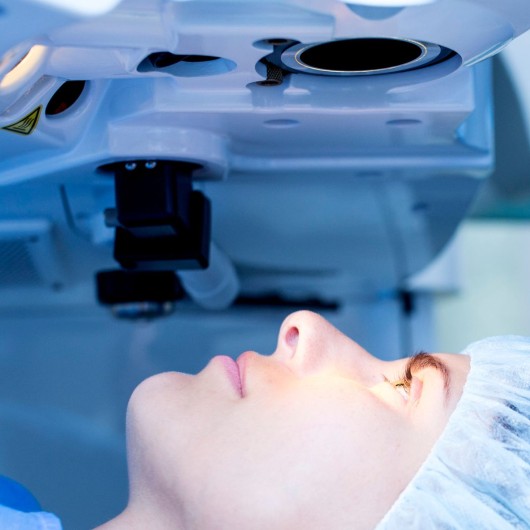
Laser surgery (LASIK) for long sightedness
- Hospital stay: Outpatient surgery
- Surgery time: 15 - 20 min (per eye)
- Anaesthesia: Topical
- Full recovery: 1 - 2 days
From price per eye
990 €
All included
Financing
from 48 €/month
Financing is available* for amounts over €150, and can be financed from 3 and to 24 months. The financing process is subject to approval by the collaborating financial entities. For further information on the financing conditions, please do not hesitate to contact us at +34 91 141 33 56 or through this contact form. Our Patient Service department will provide you with the information you need and explain the financing process. Find additional information about funding in the following link. *Operarme’s team manages the funding of surgical procedures and medical tests. The financing management of dental services is only performed at Caser Dental Clinics.
What do our patients think?
What is included?
-
Free surgical consultation
Book a free consultation with our eye specialist to explore your options for long sightedness surgery. Get to know the doctor, discuss your case, and decide together on the best solution for you.
-
Pre-operation study
All the specific preoperative eye tests required for the procedure.
-
Surgical procedure expenses and fees
Reservation and booking of the operation room, instruments, equipment,consumables and medication of the surgical procedure. Medication, medical gases, Stay in the postoperative recovery room, monitorization and necesary treatments. Surgeon, assistant and anaesthetist fees until your medical discharge.
If there was any special need in the surgical process, by express indication of the doctor, the client will be informed of the variation in the price prior to surgery, and must be accepted to continue with the process.
-
Outpatient surgery
Laser surgery for long sightedness is an outpatient procedure, so you'll be able to go home the same day.
-
Medical complications insurance
Laser surgery for Long Sightedness includes a medical complications insurance covering possible eventualities that may affect the patient during the surgical procedure and 365 days after surgical intervention, including reoperation if needed.
Medical complications insurance covers related surgical procedure expenses, such as:
- Increase in your hospital stay after surgery.
- Hospital admission after hospital discharge due to medical complications.
- Reoperation and hospital stay up to the established amount in the particular condition.
Emergency visits and follow-up consultations after medical discharge are not covered under any circumstances.
If you woud like to receive more information about this subject, please contact our patient service department.
Information of Laser surgery (LASIK) for long sightedness
- 01. All about laser surgery (LASIK) for long sightedness
- 02. What is long sightedness?
- 03. What causes long sightedness?
- 04. How is laser surgery (LASIK) for long sightedness performed?
- 05. Pre-operative process for laser surgery (LASIK) for long sightedness
- 06. Step-by-step: Laser Surgery (LASIK) for Long Sightedness
- 07. Recovery after laser surgery (LASIK) for long sightedness
- 08. Benefits and risks of laser surgery (LASIK) for long sightedness
- 09. Cost of laser surgery (LASIK) for long sightedness with Operarme
01. All about laser surgery (LASIK) for long sightedness
Laser surgery (LASIK) for long sightedness is designed to correct the vision problems caused by, as the name suggests, long sightedness. This condition mainly affects near vision, although over time it can also begin to impact distance vision, causing discomfort as images start to appear blurry.
It is usually caused by a congenital irregularity in the shape of the cornea or the lens, which prevents images from being properly focused on the retina.
Long sightedness can be easily corrected with glasses or contact lenses, but many patients find these inconvenient because they need them for many daily tasks. That’s where laser surgery (LASIK) for long sightedness comes in. This simple procedure reshapes the cornea, allowing patients to go about their daily lives without needing glasses or contact lenses.
02. What is long sightedness?
Long sightedness is a vision problem that prevents the eye from properly focusing images on the retina. This can be due to an issue with the shape of the cornea or because the eye is not the right length, leading to blurry vision up close.
Laser surgery (LASIK) for long sightedness allows patients to stop relying on glasses or contact lenses.
In simple terms, long sightedness happens when the shape of the cornea or lens causes light to focus behind the retina instead of directly on it, making images appear blurry.

Are you interested in laser surgery to correct your long sightedness problem?
Request a free and immediate appointment with our specialists in Ophthalmology and set a surgery date
03. What causes long sightedness?
In most cases, long sightedness is a congenital condition, meaning people are born with it. It usually appears when the eye is too short in length or when the cornea is too flat. Interestingly, many newborns are long sighted, but the condition often corrects itself as the eye develops. This natural correction typically happens during adolescence. If it doesn't, the condition will likely remain for life, although it usually doesn’t get worse over time.
Long sightedness occurs when a congenital issue causes light to focus behind the retina, making images appear blurry.
Symptoms of Long Sightedness
The main symptom of long sightedness is blurry vision up close. This problem often doesn’t show up during teenage years because the eye muscles that control the lens are still young and flexible, helping to compensate for the issue. As people get older, these muscles lose their flexibility and the symptoms become more noticeable. Common signs include frequent eye rubbing or regularly frowning or squinting.
There is no way to prevent long sightedness, as it is usually inherited. However, it is very important to have regular eye exams during childhood and adolescence to catch it early. People who have long sightedness should also continue regular check-ups, as the condition can sometimes be linked to glaucoma.
Recovery after laser surgery (LASIK) for long sightedness typically takes between 24 and 48 hours.
Correcting long sightedness is simple—it only requires glasses with converging lenses or contact lenses. Wearing corrective lenses is important to avoid side effects such as headaches or eye irritation.
For those who prefer not to depend on glasses or contacts, there are surgical options available to reshape the cornea and correct the issue. Among these, the most modern, widely recommended, and commonly used procedure by specialists is laser surgery (LASIK) for long sightedness.
This outpatient procedure takes less than 20 minutes and delivers excellent results.
04. How is laser surgery (LASIK) for long sightedness performed?
Laser surgery (LASIK) for long sightedness is a fairly simple procedure that is done on an outpatient basis and only takes a few minutes. However, it’s important to go through a pre-operative session beforehand. These sessions help determine the exact vision problem in each patient—since everyone’s eyes are different—and ensure there are no underlying issues that could make the surgery unsuitable.
05. Pre-operative process for laser surgery (LASIK) for long sightedness
Assuming the patient has long sightedness—although LASIK can also be used to treat short sightedness—and is over 18 years old, several tests will be done during the consultation(s) before the surgery. These tests help determine how many diopters need to be corrected. For LASIK to treat long sightedness, the correction usually falls between 1 and 5 diopters.
The pre-operative tests for LASIK laser surgery include:
- Fundus (retinal) examination, pupil measurement, and intraocular pressure check
- Vision test with and without pupil dilation
- Orbscan topography (to map the surface of the eye)
- Schirmer’s test (to assess tear production)
- Biometry (to measure the eye's physical dimensions)
If the patient wears contact lenses, they will need to stop wearing them at least two weeks before surgery—possibly longer if they wear hard lenses—unless advised otherwise by the doctor. The ophthalmologist will also recommend avoiding eye makeup in the days leading up to the procedure to reduce the risk of bacterial growth and infection.
Laser surgery (LASIK) for long sightedness is not recommended for patients with significant eye conditions, such as corneal abnormalities found in topography, cataracts, or uveitis. It’s also not suitable for pregnant women, since vision can change during pregnancy. Likewise, patients whose vision prescription has changed significantly in the last year may not be good candidates for the procedure.
06. Step-by-step: Laser Surgery (LASIK) for Long Sightedness
As mentioned earlier, laser surgery (LASIK) for long sightedness is performed on an outpatient basis, and the anesthesia used is topical. This means it’s applied directly to the eye in the form of eye drops.

Are you interested in laser surgery to correct your long sightedness problem?
Request a free and immediate appointment with our specialists in Ophthalmology and set a surgery date
- After the anesthesia is administered, the patient is asked to keep their eye closed to prevent it from drying out due to the temporary loss of sensitivity.
- In the operating room, the patient must follow all instructions given by the surgeon. They will lie down on a surgical table, and the eye that is not being operated on will be covered with a sterile cloth or dressing.
- Next, a special device is used to keep the eyelids open, preventing the eye from closing during the procedure.
- The surgeon will then rinse the eye and surrounding area with saline solution. At this point, the patient might feel pressure on the eye and may even temporarily lose vision—this is completely normal and not dangerous.
- Using a tool called a microkeratome, the surgeon lifts a thin flap from the surface of the cornea—about one-tenth of a millimeter thick. This flap remains attached to the eye at one edge. This step allows the laser to directly reshape the corneal bed beneath.
- The surgeon then activates the laser and applies it to the corneal tissue. This part usually lasts less than a minute. The patient won’t see the laser, but may hear its distinct sound. It’s very important that the patient keeps looking steadily at the guiding light indicated by the surgeon, even if their vision is blurry. Staying focused on this light helps ensure the procedure is accurate.
- Finally, the surgeon rinses the cornea and carefully repositions the flap. No stitches are needed, as the natural adhesive quality of the corneal tissue holds it in place securely.
The entire procedure typically takes between 15 and 20 minutes from start to finish. It's also important to note that the surgery is completely painless.
07. Recovery after laser surgery (LASIK) for long sightedness
After laser surgery (LASIK) for long sightedness, no hospital stay is required. The patient can leave the clinic immediately after the procedure and walk out on their own, without the need to cover the treated eye. The surgery is completely painless, both during and after. However, during the first 6 hours post-surgery, the patient may experience stinging, tearing, and sensitivity to light.
Vision in the treated eye gradually improves over the following days, with noticeable improvement typically within the first 48 hours. The speed of visual recovery depends on the severity of the original vision problem—the greater the correction, the longer the recovery may take.
The greater the vision defect corrected, the longer the recovery time after laser surgery (LASIK) for long sightedness.
In the weeks following the procedure, patients often experience increased dryness in the eye. To address this, the ophthalmologist will prescribe artificial tears. In some cases, this treatment may need to continue for several months.
08. Benefits and risks of laser surgery (LASIK) for long sightedness
The main benefit of laser surgery (LASIK) for long sightedness is the correction of the condition and the elimination of the patient’s dependence on glasses or contact lenses. Additionally, this surgery is painless and offers a fast recovery time, especially when compared to other types of procedures used to correct long sightedness.
Laser surgery (LASIK) for long sightedness is an outpatient procedure performed with topical anesthesia.
As with any surgical intervention, LASIK also carries some risks. While rare, these include the possibility of small conjunctival hemorrhages caused by the suction ring in the immediate postoperative period.
There is also a slight chance of an incomplete cut during the use of the microkeratome, which could require postponing the procedure—this happens in approximately 1 out of every 1,000 cases.
Other possible complications include infection (about 1 in every 5,000 cases) and damage to the corneal surface due to postoperative dry eye. Fortunately, this last issue is treatable with proper care and time.
09. Cost of laser surgery (LASIK) for long sightedness with Operarme
The price of laser surgery (LASIK) for long sightedness is fixed and all-inclusive. This means it covers everything necessary to carry out the procedure with maximum safety, backed by the quality of the hospital and the experience of the specialist.
The cost of the surgery with Operarme is 990 € for treatment of one eye. This price includes:
- Operating room booking and use
- Postoperative check-ups for 30 days after the surgery
- Surgeon’s fees
- Anesthesiologist’s fees
- Nursing team fees
- All surgical materials required for the procedure (LASIK laser)
- Anesthesia and recovery room reservation
- Medical complications insurance, which covers rare but possible unforeseen events
If you’d like more information about this surgery or about how Operarme works, feel free to contact us via our contact form, call us at +34 91 141 33 56, or request a free surgical evaluation with our Ophthalmology Specialists by clicking below:

Are you interested in laser surgery to correct your long sightedness problem?
Request a free and immediate appointment with our specialists in Ophthalmology and set a surgery date
Fixed price
990 €
All included
Financing
from 48 €/month
Financing is available* for amounts over €150, and can be financed from 3 and to 24 months. The financing process is subject to approval by the collaborating financial entities. For further information on the financing conditions, please do not hesitate to contact us at +34 91 141 33 56 or through this contact form. Our Patient Service department will provide you with the information you need and explain the financing process. Find additional information about funding in the following link. *Operarme’s team manages the funding of surgical procedures and medical tests. The financing management of dental services is only performed at Caser Dental Clinics.
Step by step
-
Ask for a free consultation with our specialist in Ophthalmology.
-
Information will be sent to your email address.
-
We will call you to confirm the date.
-
Meet the doctor and decide if you would like to have the surgical procedure with us.
-
Correct your long sightedness problem and regain your quality of life.
What do our patients think?
Frequent Questions
-
Do you have questions? Get free advice on contracting our medical services
Before requesting an appointment with our specialist, you may want to know a little more about the entire process in Operarme. Therefore, we offer you a free advisory service so that you can resolve any questions you may have:
- How is the surgery managed?
- What services are included?
- Can it be financed?
- What should I do if I don't have medical tests or reports ?
- What advantages do I get being an Operarme's patient?
Request the service by clicking below and our patient service team will contact you in less than 24 working hours. This service does not imply commitment to contract our services. Do not hesitate and request our assessment by clicking here:

Free Assessment for Contracting Medical Services
Operarme’s Patient Service will contact you and solve all your questions on the medical service you need.
Request information Request information -
Do I have to take a PCR test before surgery?
Currently our collaborating hospitals and surgeons do not ask patients to take a PCR test as a mandatory requirement to enter the operating room.
If exceptionally this test would be required by the hospital or surgeon, we inform you that the PCR test is not included in the price of the surgery.
If you have any questions about this specific issue, please contact our patient service department.

Laser surgery (LASIK) for long sightedness
- Hospital stay: Outpatient surgery
- Surgery time: 15 - 20 min (per eye)
- Anaesthesia: Topical
- Full recovery: 1 - 2 days
From
990 €
All included
Financing
from 48 €/month
Financing is available* for amounts over €150, and can be financed from 3 and to 24 months. The financing process is subject to approval by the collaborating financial entities. For further information on the financing conditions, please do not hesitate to contact us at +34 91 141 33 56 or through this contact form. Our Patient Service department will provide you with the information you need and explain the financing process. Find additional information about funding in the following link. *Operarme’s team manages the funding of surgical procedures and medical tests. The financing management of dental services is only performed at Caser Dental Clinics.


